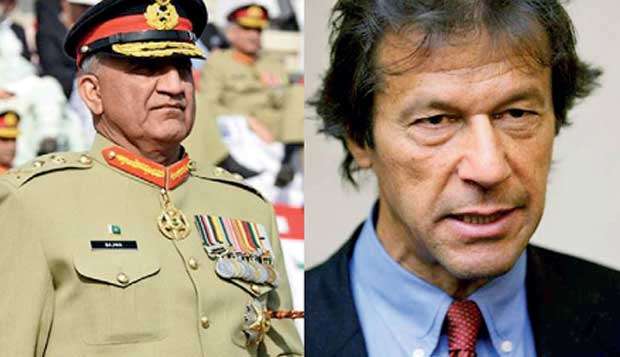31 Jul 2018 - {{hitsCtrl.values.hits}}

 Waiting for more than two decades in the Opposition to grab power from established political parties like the Pakistan Muslim League-Nawaz (PML-N) and the Pakistan Peoples Party (PPP), Pakistan’s Prime Minister- to-be Imran Khan has had the time to deeply analyse Pakistani politics and arrive at some home truths.
Waiting for more than two decades in the Opposition to grab power from established political parties like the Pakistan Muslim League-Nawaz (PML-N) and the Pakistan Peoples Party (PPP), Pakistan’s Prime Minister- to-be Imran Khan has had the time to deeply analyse Pakistani politics and arrive at some home truths.
One of the truths he has learned is that the supremacy and pre-eminence of the armed forces, particularly the army, cannot be, and should not
be, challenged.
Challenging the military will be both futile and dangerous. All said and done, with all the institutional trappings of a modern democracy, Pakistan continues to be under the tutelage of the armed forces, or to be precise, the army, the largest and the most important of the three services.
The army is “the final arbiter” of the destiny of Pakistan. This is so for historical reasons but also because,these days, practically every national question is subsumed under the rubric of “national security”. Even established “democratic states” are becoming de facto “national security states.”
Speaking about the place of the army in the Pakistani national scheme, Imran told an interviewer: “I think a democratic government rules from moral authority. And if you don’t have moral authority, then those who have the physical authority assert themselves.”
“In my opinion, the army is a Pakistani Army and not an enemy army. I will carry the army with me.”
Unlike Nawaz Sharif, who had fallen out with the army over the issue of peace with India and lost power twice because of that, Imran has consistently praised the army and acknowledged its stabilizing role in Pakistani politics and governance.
Pakistan has a long history of seeking the help of the army to restore governance made dysfunctional by squabbling politicians. It was political confusion and frequent changes in government which brought the army into the game for the first time in 1958
He blames corrupt and irresponsible civilian leaders and neighbouring India and Afghanistan for the entry of the army into Pakistani politics and governance.
“The hostility of India and Afghanistan toward Pakistan forces the military to play an outsize role in the country. I have very clear foreign policy objectives, and where there are security concerns of the army, we will address them. It is our army,” Imran said.
On another occasion, Imran declared that nothing can be done in Pakistan by maligning the army and rhetorically declared: “Now is the time to decide whether we want to be used by the enemy and turn against the Pakistan army. The country will not survive if the army does not.”
Imran was close to the extremist former Inter-Services Intelligence Chief Gen. Hamid Gul who he had hailed as a “Mujahid” (one who strives for the cause of God).
Nawaz Sharif had dubbed Imran as the “ladla” or the “pet” of the army for all his utterances. Sharif’s daughter Maryam Nawaz had dubbed him a “stooge”. But Imran retorted saying that Sharif was “brought up on the lap of Gen. Zia-ul-Haq”, the military dictator of the 1980s who Islamized Pakistan. Subsequently, Sharif had used army financial backing to rig elections in 1990. In 2012 the Supreme Court had officially ruled that two Army Generals, Mirza Aslam Baig, and Asad Durrani (Head of ISI) along with President Ghulam Ishaq Khan, had provided financial assistance to Sharif’s election campaign in 1990.
In 1993 the then army Chief Gen. Abdul Waheed Kakar had persuaded both President Ghulam Ishaq Khan and Prime Minister Sharif to step down. During his second term, which began in 1997, Sharif appointed Gen. Pervez Musharraf as Army Chief in 1998. But Musharraf sacked Sharif in 1999 because of his soft policy towards India.
According to the Pakistani military historian Dr. Ayesha Siddiqa, in 2007, when President Gen. Musharraf was committing excesses against the Supreme Court Chief Justice Iftikhar Choudhry, the then Army chief, Gen. Ashfaq Kayani put Musharraf under a “brief but forced detention” to make him relent.
Prior to that Mushrraf had to back out of his bid to strike a deal on Kashmir with India because the army’s three star Generals felt that hostility to India is the army’s “raison d’etre” and, therefore, confrontation should be maintained.
Pakistan has a long history of seeking the help of the army to restore governance made dysfunctional by squabbling politicians. It was political confusion and frequent changes in government which brought the army into the game for the first time in 1958.
Since then there have been three successful military coups and four periods of military rule. Pakistan was under direct military rule for 17 years (between 1956-62/1969-71/1977 to 1988/1999 to 2002). It was under an elected civilian government but functioning under a military President for 15 years (from 1962 to 1969/1985-1988/2002-2007). Between 1988 and 1999, civilian governments were under the close watch of the army. Pakistan had untrammelled civilian rule only between 1971 and 1977 under Z.A. Bhutto.
Since the earliest days, Pakistani politicians had made it a habit to hobnob with the military and use it to achieve their narrow political ends. The military naturally took advantage of this and dictated terms, which the politicians generally accepted. In case they didn’t or they failed to live up to the army’s expectations or fell out of line, they would get thrown out, either through a coup or through electoral rigging.
Military in Pakistani Economy
According to Dr. Ayesha Siddiqa, authoress of “Military Inc. Inside Pakistan’s Military Economy (Penguin-Random House 2007 and 2017) the military’s nett worth is more than British Pounds 10 billion (US$ 13.1 billion). She found that in 2007, the army owned 12% per cent of the country’s land, its holdings being mostly fertile soil in the eastern Punjab. Two thirds of that land were in the hands of senior current and former military officials, mostly Brigadiers, Majors-General and Generals. The most senior 100 military officials were estimated to be worth GBP 3.5 billion (US$ 4.5 billion).
Many of the country’s largest corporations are controlled by the military, thanks largely to an opaque network of powerful ‘Foundations’ originally set up to look after the pension needs of army personnel, Siddiqa says. The largest three — the Fauji, Shaheen and Bahria Foundations, controlled by the army, air force and navy respectively, run more than 100 commercial entities involved in everything from cement to cereal production. Only nine had ever published partial financial accounts.
The Fauji foundation, the largest, is estimated by Siddiqa to be worth several billion pounds. The Army Welfare Trust runs one of the country’s largest banks, Askari Commercial Bank, along with an airline, a travel agency and even a stud farm. Then there is the National Logistic Cell, Pakistan’s largest shipper and freight transporter and the country’s largest corporation, which builds roads and bridges and stores grain.
President Gen. Pervez Musharraf banned the 2007 edition of Siddiqa’s book. In his blog he published an article refuting her data. Firstly the military running businesses is not peculiar to Pakistan, the article pointed out.
The army is “the final arbiter” of the destiny of Pakistan. This is so for historical reasons but also because,these days, practically every national question is subsumed under the rubric of “national security
 The US and UK have Private Military Enterprises (PME). Prominent US PMEs are: Halliburton, Black Water World Wide, Defence security, Titan Corporation, Kellogg Brown and Roots, Air Scan, Dyn Corp’s and CACI International. The UK has Black Op’s, and Aegis Defence Services, which were beneficiaries of the Iraq war. Worldwide PMEs are worth US$ 100 billion.
The US and UK have Private Military Enterprises (PME). Prominent US PMEs are: Halliburton, Black Water World Wide, Defence security, Titan Corporation, Kellogg Brown and Roots, Air Scan, Dyn Corp’s and CACI International. The UK has Black Op’s, and Aegis Defence Services, which were beneficiaries of the Iraq war. Worldwide PMEs are worth US$ 100 billion.
Musharraf’s blog also pointed out that Pakistan’s military businesses (MILBUS ) were only a fraction of the enterprises in the country. Out of the 24 cement factories in Pakistan only one was owned by the Fauji Foundation; only one of 10 fertilizer plants belongs to the military; and only 10 of the 924 hospitals were run by a military foundation.
In 2007, the total value of MILBUs in Pakistan was only US$ 1.1 billion, which was only 0.8% of the country’ US$ 160 billion free market economy, Musharraf’s blog said.
28 Oct 2024 1 hours ago
28 Oct 2024 2 hours ago
28 Oct 2024 5 hours ago